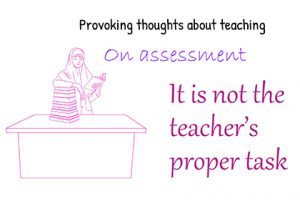Provoking thoughts about education #6: On assessment

Twenty seconds to really make you think – #6: On assessment
Provocative quote number 6. Could this 15 seconds of video change your whole view of assessment? From John Holt’s ‘How Children Fail’. Click the image to watch the very short video of the full quotation.
Feel free to share with your team to start the conversation..
‘It is not the teacher’s proper task to be constantly testing and checking the understanding of the learner. That’s the learner’s task, and only the learner can do it.’
[John Holt, (1964) ‘How Children Fail’: Penguin, Page 36]
You may be interested in this training session: Assessment and the Art of Lazy Teaching




Hi Tony, thank you for this thought provoking illustration, it is certainly the topic of talk at the moment. In relation to the quote above, I am intrigued to know your perspective regarding effective modes of testing and checking the understanding of the learner. How does this translate when all learning is online/distance learning? Have you observed particular methods/tools to be more effective than others?
Hi William. Many thanks for your note. When I’m observing, I pretty much only see four types of assessment practice set out in lesson plans and live in class: observation, Q&A, discussion and feedback. And they’re mostly used summatively rather than formatively – in other words, they’re so the teacher can know what the learners can remember, and don’t lead to a direct next step for the learners. Teacher assessment should always be plan B, as assessment is primarily not about them. Without this seeming like a shameless plug, my Assessment and the Art of Lazy Teaching session introduces delegates to the Fifty Shades of Assessment, none of which are about observation, feedback or Q&A; they’re all learner-centred and formative. As teachers, we need to plan schemes of work and lesson plans that incrementally and continually build learners’ ability to assess themselves against an image of quality they hold which is in line with ours. This is not just the morally right thing to do, it also saves teachers a huge amount of ‘preventable contact’ time. Best wishes, Tony.